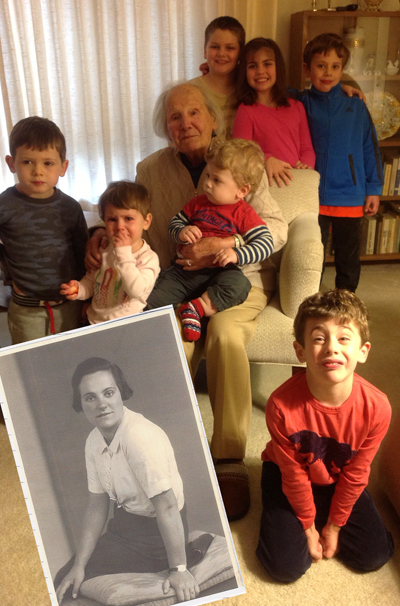By Charlene Kahn , JTNews Correspondent
During the first weekend in April, guests from California to Connecticut converged on Seattle in honor of Ruth Schocken, whose life story is a poignant reminder of survival. She turned 100 on April 3.
The life of this German-Jewish immigrant who escaped the Nazis at age 25 and created a new life in the Pacific Northwest can be seen as a testament to family values, hard work and exceptionally strong will, both mentally and physically.
Though all three of Schocken’s adult children live in the area and are actively involved in their mother’s life, she lives independently, though her physical mobility has recently decreased. Still, Schocken has a matter-of-fact quality about herself, according to her daughter, Barbara Lahav.
Before offering up a generous slice of marzipan-covered birthday cake, Schocken spoke with JTNews between visits from out-of-town relatives as her daughter helped supply anecdotes. Flowers and family photo displays decorated a cozy living space. A framed letter from President and Mrs. Obama shared birthday congratulations from the White House.
Growing up as the youngest of eight in Bielefeld, Germany, Ruth Hamlet Schocken experienced loss early on. Her oldest brother died during World War I. Louis, her father, was a meat wholesaler and an active member of the local synagogue; of her mother, Schocken said, “the whole town liked her cooking.”
As a youngster, Ruth pitched in, bringing bread to the communal oven. She later trained in window display and visual merchandising and went to work for her sister Thea and brother-in-law Fritz at the Leeser Silk Haus in Herford, Westphalia.
“[By that time] we were just lucky we got out,” she recalled. “The SS were already coming around the store and wouldn’t let people go in.”
This was in 1938, just before Kristallnacht. They couldn’t leave Germany because “they had no liquid assets,” said Lahav. “Everything was tied up in the store.”
But one evening Schocken left work late, forgetting to turn off her iron. By the next morning, “the whole interior burnt down — but my sister ran to me smiling,” she said.
They now had insurance money and a way to leave “because of an iron,” she said. “In less than a year we got out.”
They made it to the U.S., but not without some lasting trauma: A fear of uniforms left Schocken unable to tolerate even a driving test.
After coming to Seattle, Schocken met her husband, another German-Jewish refugee, through friends.
“It’s like little Switzerland [here],” she said. “I came to Seattle because my sister and brother-in-law were here already; I first came to Cincinnati but didn’t like the heat.”
Her husband Heinz, which he Americanized to Henry, was related to the famed Schocken literary and publishing family through his father, whose older brother Salman established Schocken Books and became publisher of the Israeli newspaper Ha’aretz. Amos Schocken, a cousin of Ruth Schocken’s children, runs the newspaper today.
Establishing roots in Seattle revolved around synagogue and social connections with other refugees.
“The Jewish Club of Washington was a very important gathering place for our family,” said Joe Schocken, Ruth’s son, of the club that reached out to new arrivals and helped provide moral and financial support. The club disbanded last year.
But the Schockens joined another institution that has thrived throughout the years — the Herzl congregation on 20th and Spruce in the Central District, which is now Herzl-Ner Tamid on Mercer Island. The family is in its fourth generation of membership — four generations happy to celebrate the centennial of its matriarch.
“It’s obviously very special to have mother at this age, [for her] to enjoy and participate in the lives of her children, grandchildren and great grandchildren,” said Joe Schocken. “It’s great to be able to tell the story and create family history.”
